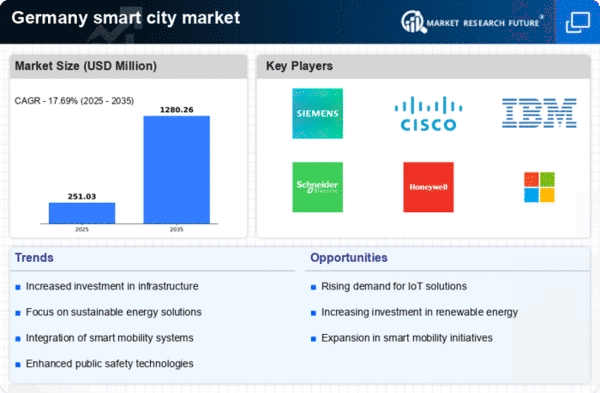Rising Urbanization Trends
Germany is witnessing a significant trend of urbanization, with approximately 77% of its population residing in urban areas as of 2025. This shift creates a pressing need for efficient urban management solutions, thereby propelling the smart city market. Urbanization leads to increased demand for services such as transportation, energy, and waste management, necessitating the adoption of smart technologies. Cities are increasingly leveraging data analytics and IoT solutions to optimize resource allocation and enhance service delivery. Consequently, the smart city market is expected to expand as municipalities seek innovative ways to address the challenges posed by growing urban populations and improve overall urban living conditions.
Government Initiatives and Funding
The German government actively promotes the smart city market through various initiatives and funding programs. With a commitment to invest over €1 billion in smart city projects by 2025, these efforts aim to enhance urban infrastructure and improve the quality of life for citizens. The funding is directed towards innovative technologies, including smart lighting, waste management systems, and energy-efficient buildings. This financial support not only stimulates local economies but also encourages public-private partnerships, fostering collaboration between municipalities and technology providers. As a result, the smart city market is likely to experience accelerated growth, driven by these strategic investments and the government's vision for sustainable urban development.
Focus on Environmental Sustainability
Germany's commitment to environmental sustainability significantly impacts the smart city market. With ambitious targets to reduce greenhouse gas emissions by 55% by 2030, cities are increasingly adopting smart technologies to achieve these goals. Initiatives such as smart waste management and energy-efficient buildings are becoming prevalent, reflecting a broader trend towards sustainable urban development. The integration of renewable energy sources and smart grids further supports this focus, enabling cities to optimize energy consumption and reduce their carbon footprint. As environmental concerns continue to rise, the smart city market is likely to expand, driven by the demand for sustainable solutions that align with national and local sustainability objectives.
Public Demand for Enhanced Quality of Life
There is a growing public demand in Germany for improved quality of life in urban environments, which significantly influences the smart city market. Citizens are increasingly advocating for better public services, sustainable transportation options, and enhanced safety measures. This demand drives municipalities to invest in smart technologies that facilitate real-time data collection and analysis, enabling more responsive governance. For instance, smart traffic management systems can reduce congestion and improve air quality, directly addressing public concerns. As cities strive to meet these expectations, the smart city market is likely to flourish, with a focus on solutions that enhance the overall urban experience.
Technological Advancements in Infrastructure
Technological advancements play a crucial role in shaping the smart city market in Germany. Innovations in areas such as artificial intelligence, big data, and IoT are transforming urban infrastructure, making it more efficient and responsive. For example, smart grids enable better energy management, while connected sensors facilitate real-time monitoring of public services. The integration of these technologies not only enhances operational efficiency but also supports sustainability goals. As cities adopt these advanced solutions, the smart city market is poised for growth, driven by the need for modernized infrastructure that can adapt to the evolving demands of urban populations.















